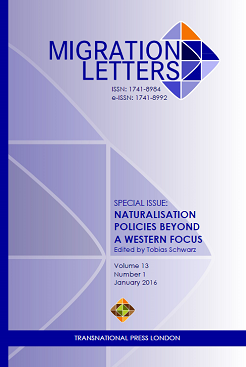‘One country, two systems’, ‘one city, two systems’: Citizenship as a stage for politics of mobility and bordering practices in Hong Kong
‘One country, two systems’, ‘one city, two systems’: Citizenship as a stage for politics of mobility and bordering practices in Hong Kong
Author(s): Maggi LeungSubject(s): Geography, Regional studies, Governance, Government/Political systems, Migration Studies
Published by: Transnational Press London
Keywords: Hong Kong; right of abode; migration; politics of mobility; border;
Summary/Abstract: Drawing on the notion of ‘politics of mobility’ and conceptualization of borders, this paper illustrates the peculiar, controversial and discriminatory citizenship policy, practice and discourse in Hong Kong. Under the ‘One Country, Two Systems’ constitutional principle, Hong Kong is separated from the China Mainland by an administrative border and exercises a separate residence rights regime. This paper highlights the tension produced by Hong Kong’s citizenship politics pursed by the state in turning the metropolitan into ‘Asia’s world city’ in this ‘One Country, Two Systems’ context. The world-city project entails offering right of abode (quasi citizenship) to highly-skilled migrants, ‘outstanding talents’ and investors while discriminating against those considered inappropriately-skilled such as poor family reunion migrants from mainland China.
Journal: Migration Letters
- Issue Year: 13/2016
- Issue No: 1
- Page Range: 49-63
- Page Count: 15
- Language: English

